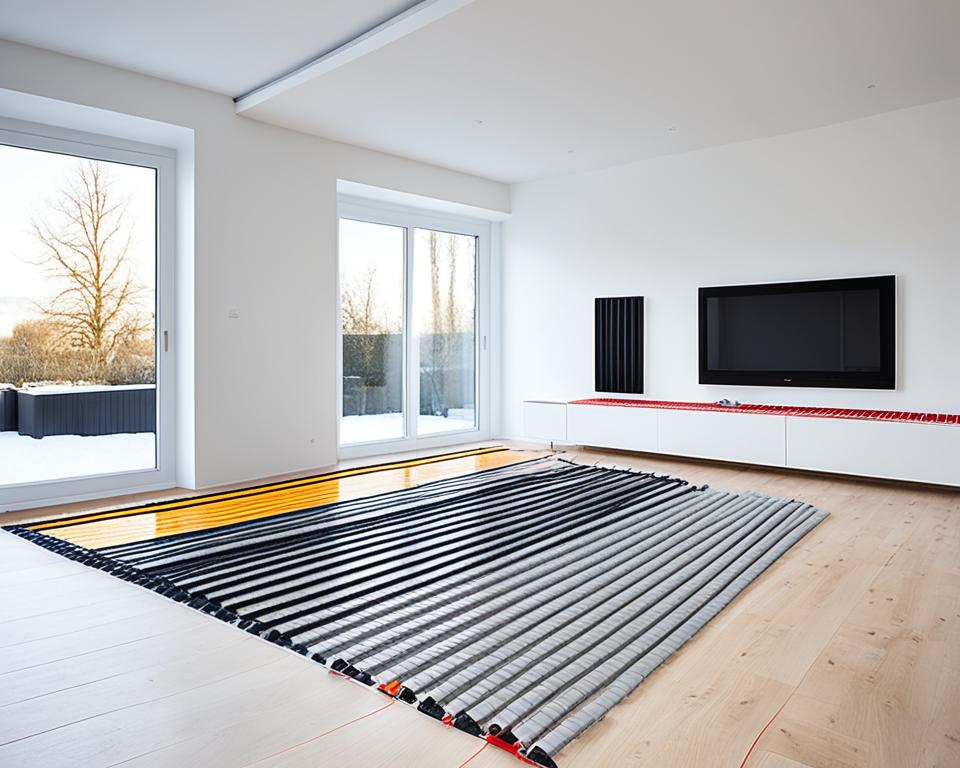As we seek more sustainable lifestyles, the question often arises: can our quest for a greener planet align with our need for fiscal prudence? The answer lies in the heart of every American home—the heating system.
With electric heating, achieving efficient home heating is not just a possibility; it’s a practical reality that promises significant utility bill savings and substantial environmental emissions reduction.
We’ve grown accustomed to the idea that comfort often comes at a cost, both to our wallets and the environment. However, the notion that one must sacrifice fiscal health for physical warmth is becoming outdated.
Approximately 29% of the utility bill can be attributed to heating—a hefty sum and energy footprint ripe for optimization. The whole-house approach we’ll explore transforms how you heat your home, balancing personal comfort with planetary responsibility.
Join us in this comprehensive guide as we discuss how to not only maintain and upgrade your heating systems but also incorporate best practices in insulation, air sealing, and smart thermostat use—measures designed to cut costs and carbon footprints. Whether it’s choosing a high-efficiency heat pump or simply changing your furnace filters, every step toward efficient heating is a step toward healthier finances and a healthier planet.
Tabe of Contents
- Understanding Electric Heating and Its Benefits
- Types of Electric Heaters for Your Home
- Maximizing Your Electric Heating System’s Efficiency
- Installation and Maintenance of Electric Heating Systems
- People Also Ask
- What Is Electric Heating?
- What Are the Advantages of Electric Heaters?
- How Do Electric Heating Systems Compare in Energy Consumption and Costs?
- What Types of Electric Heaters Are Suitable for My Home?
- How Can I Maximize My Electric Heating System’s Efficiency?
- Should I Install My Electric Heating System Myself or Opt for Professional Installation?
- What Maintenance Tips Should I Follow for My Electric Heaters?
- When Is It Time to Upgrade My Electric Heating Equipment?
- How Have Electric Heat Pumps Changed the HVAC Landscape?
- Are There Innovations in Electric Radiant Heating and Underfloor Systems?
- In What Environments Are Electric Wall and Baseboard Heaters Most Suitable?
- Final Words on Electric Heating
Key Takeaways
- Discover the potential of Electric Heating to bring about both Utility Bill Savings and Environmental Emissions Reduction.
- Understanding the financial and ecological benefits of adopting a whole-house approach for Efficient Home Heating.
- Explore innovative, high-efficiency heating solutions, including how proper thermostat settings can lead to significant energy savings.
- Learn about the dual benefits of heat pumps, offering exceptional efficiency for heating and cooling needs.
- Insight into practical, day-to-day adjustments that have substantial impacts on energy use and costs.
- Consideration of ENERGY STAR-certified products as a path to smarter, more eco- and wallet-conscious heating decisions.
Understanding Electric Heating and Its Benefits
As we explore the various heating options available to us, electric heating systems stand out due to their efficiency and eco-friendliness. Let’s delve into what electric heating is and the myriad benefits it offers over conventional heating methods.
What Is Electric Heating?
Simply put, electric heating converts electricity into heat. This multifaceted technology encompasses electric resistance heating, electric radiant heating, and the increasingly popular electric heat pump.
Each system offers a suite of efficient heating solutions for different circumstances and preferences within our homes and workplaces.
The Advantages of Electric Heaters
What makes electric heaters a choice worth considering? For starters, they are recognized for their efficient systems with minimal energy waste and are often more cost-effective in terms of long-term energy consumption. Moreover, electric heat pumps are notable for their versatility, providing both heating in the winter and cooling in the summer, making them an all-season solution.
Comparing Energy Consumption and Costs
When it comes to assessing the cost-saving potential of an electric heating system compared to conventional fuel-based options, the long-term benefits are clear. Electric heaters often lead to lower energy bills and reduced grid dependence as renewable energy sources become more prevalent. To illustrate the differences, let’s compare electric heating types with traditional methods:
| Heating System Type | Average Energy Efficiency | Average Cost Over 10 Years | Noise Level | Environmental Impact |
|---|---|---|---|---|
| Electric Heat Pump | Up to 300% | $5,000 – $10,000 | Low | Lower carbon footprint |
| Electric Radiant Heating | 100% | $3,000 – $7,000 | None | Eco-friendly with renewable energy |
| Traditional Furnace | 80-90% | $7,000 – $15,000 | Medium to high | Higher emissions |
In summary, switching to or implementing an electric heating system in your home not only optimizes energy usage but also contributes to a sustainable future, offering tangible cost-saving benefits and a positive step toward reducing our carbon footprint.
Types of Electric Heaters for Your Home
As we explore the realm of home heating, there’s a wealth of electric heater types each designed to meet the diverse needs and preferences of homeowners. In this section, we will delve into the various electric heaters that can enhance your living space’s warmth and comfort, highlighting the unique features and functionalities of each one.
- Electric Underfloor Heating: Known for creating a uniform and comfortable warmth underfoot, electric underfloor heating systems are an invisible and space-saving choice. They are particularly efficient in rooms with ceramic or stone flooring, where the system’s radiant heat can shine.
- Electric Radiant Heating: This type not only includes underfloor systems but also involves ceiling and wall installations. Electric radiant heating panels can provide a clean look and focus warmth exactly where it’s required.
- Electric Baseboard Heater: These are straightforward to install and operate, making them a convenient option for supplementing heat in any room. The heaters’ design allows them to blend into the room’s baseboard seamlessly.
- Electric Wall Heater: If you’re looking for a quick and targeted way to heat up a space, electric wall heaters are a go-to option. They’re often used in bathrooms and other small areas where space is limited.
- Electric Panel Heater: These sleek units can be mounted on walls and are an aesthetic choice for modern homes. They provide quick heating solutions with a variety of control options.
| Heater Type | Key Features | Ideal Usage |
|---|---|---|
| Electric Underfloor Heating | Even heat distribution, no loss of living space | Living rooms, bathrooms, kitchens |
| Electric Radiant Heating | Directly heats objects and people, energy-efficient | Whole-house heating, luxury installations |
| Electric Wall Heater | Fast heating, compact design | Small rooms, supplemental heating |
| Electric Baseboard Heater | Quiet operation, easy installation | Bedrooms, living areas, offices |
| Electric Panel Heater | Stylish, wall-mounted, customizable settings | Additional heating, modern spaces |
With our focus on providing comfort and efficiency, we strongly consider the layout of your home and heating requirements to select the best electric heating solution available. Whether you prefer the discreet warmth of electric floor heating, the targeted heat from an electric panel heater, or the reliable coziness from an electric baseboard heater, there is a fitting option to cater to the comfort of your home.
Maximizing Your Electric Heating System’s Efficiency
To attain efficient home heating and reduce our utility costs, it is crucial to adopt a whole-house approach. This strategy not only focuses on the immediate heating unit but also on the larger picture of your home’s energy consumption patterns.
One key element of this approach is the implementation of a programmable thermostat. This device allows us to set specific temperatures for different times of the day, ensuring that we’re not heating an empty house, but always returning to a comfortably warm environment. When paired with a modern heat pump efficiency is amplified, as these devices excel at maintaining a constant temperature.
Another component of maximizing efficiency is insulation. Proper insulation can significantly cut down the energy needed to keep your home warm by reducing the amount of heat that escapes. Insulation should be an integral part of any efficiency plan, from the attic to the basement, to ensure a well-sealed and warm living space.
- Regular maintenance including cleaning or replacing filters to maintain airflow
- Placement of radiator reflectors to direct heat into the room, not the walls
- Utilizing natural sunlight through strategic window management, enhancing heat gain
- Choosing ENERGY STAR-certified equipment when upgrading for peak efficiency
Collectively, these measures contribute to an overarching scheme that prioritizes energy conservation and cost-effectiveness, allowing us to enjoy the comfort of our homes without the burden of excessive utility bills. Our goal is to not only heat our homes but to do so with the utmost regard for efficiency and environmental responsibility.
Installation and Maintenance of Electric Heating Systems
Embarking on the journey of installing an electric heating system in your home marks a move towards enhanced comfort and energy efficiency. Whether opting for an electric heat pump installation or other efficient systems, understanding the procedures and upkeep can further enrich your experience.
Let us dive into the intricacies of proper installation and provide you with maintenance tips to keep your electric heaters in top-notch condition.
DIY vs. Professional Installations
While there’s a certain allure to the DIY route, professional installation of electric heating systems is often a wise choice. Certified HVAC technicians bring the expertise needed to ensure your system is not only installed correctly but also customized to the specific requirements of your home. The result is a seamless integration of your new, efficient system for optimal performance and energy savings.
Remember, safety comes first. Electric heat pump installation is intricate and best left to professionals to avoid potential hazards. Your peace of mind is paramount, and with experts handling the installation, you can rest assured that every wire and component complies with rigorous safety standards.
Maintenance Tips for Electric Heaters
Maintenance is paramount when it comes to the longevity and efficiency of electric heaters. From cleaning filters to scheduling annual check-ups, keeping up with the upkeep ensures your heating system performs efficiently.
- Regularly replace or clean air filters to promote healthier air flow and efficiency.
- Inspect for any obstructions around units to guarantee unimpeded air distribution.
- Test thermostat accuracy and responsiveness to assure the comfort levels in your home.
Adhering to these maintenance tips will help maintain electric heaters’ longevity and conserve their effectiveness, ensuring you continue to enjoy the benefits of a warm and inviting home.
When to Upgrade Your Electric Heating Equipment
We must be vigilant and recognize when our heating arrangements no longer serve us as efficiently as they once did. An aging system not only exerts itself harder, costing you more on your energy bills but is also less capable of delivering the comfort you deserve.
Is your electric heater over 15 years old? It might be time to consider energy-efficient upgrades. Inverter heat pumps can dynamically adjust to the needs of your space, mimicking the adaptability of a car’s cruise control to save on energy costs.
Remember that upgrading to modern, efficient systems can transform your living space while also being a financially savvy move in the long run. The investment today paves the way for substantial savings on future bills, thanks to the advancements in energy-efficient technology.
People Also Ask
What Is Electric Heating?
Electric heating is a system that uses electric power to generate heat for space heating needs. It converts electric energy into thermal energy and encompasses several technologies, including electric resistance heaters, electric radiant heating, and electric heat pumps.
What Are the Advantages of Electric Heaters?
Electric heaters offer several benefits, such as higher energy efficiency compared to traditional fuel-based systems, lower environmental emissions, quieter operation, reduced maintenance requirements, and the ability to integrate with renewable energy sources.
How Do Electric Heating Systems Compare in Energy Consumption and Costs?
Electric heating systems, especially heat pumps, tend to be more energy-efficient than conventional heating methods. While the initial costs of electric heating can be higher, energy savings over time can offset this, resulting in lower utility bills and a reduced carbon footprint.
What Types of Electric Heaters Are Suitable for My Home?
The suitability of electric heaters for your home depends on your specific needs and the layout of your space. Options include electric underfloor heating, electric radiant panels, electric wall heaters, electric baseboard heaters, and electric panel heaters.
How Can I Maximize My Electric Heating System’s Efficiency?
To maximize efficiency, use a whole-house approach that includes proper insulation, air sealing, and programmable thermostats. Regular maintenance, such as cleaning filters and ensuring unobstructed airflow, also contributes to efficient operation.
Should I Install My Electric Heating System Myself or Opt for Professional Installation?
For optimal efficiency and safety, professional installation of your electric heating system is recommended. Professionals can ensure the correct sizing and installation, leading to better performance and longevity.
What Maintenance Tips Should I Follow for My Electric Heaters?
Maintenance tips for electric heaters include regularly cleaning or replacing filters, checking and cleaning heating registers, and having annual system check-ups by a professional. Also, using heat-resistant radiator reflectors can improve the efficiency of your system.
When Is It Time to Upgrade My Electric Heating Equipment?
Consider upgrading your electric heating equipment when it becomes less energy-efficient, when newer more efficient technology is available, when your heating needs change, or when your current system requires frequent and costly repairs.
How Have Electric Heat Pumps Changed the HVAC Landscape?
Electric heat pumps have revolutionized HVAC with their dual heating and cooling capabilities, offering highly efficient performance by transferring heat instead of generating it. This makes them a cost-effective and environmentally friendly option for many homeowners.
Are There Innovations in Electric Radiant Heating and Underfloor Systems?
Yes, innovations in electric radiant heating and underfloor systems include improved energy efficiency, easier installation methods, and better integration with smart home technologies, providing customizable and comfortable heating solutions.
In What Environments Are Electric Wall and Baseboard Heaters Most Suitable?
Electric wall and baseboard heaters are best suited for rooms or areas that require supplemental heating, for homes without central heating systems, or when you need additional warmth in a specific space for a limited time.
Final Words on Electric Heating
As we explore the dynamic realm of electric heating, we’re witnessing a substantial shift in how homes are kept warm and comfortable. At the heart of this transformation are electric heat pumps, which have emerged as a groundbreaking solution in the heating, ventilation, and air conditioning (HVAC) industry.
These versatile systems represent the pinnacle of efficiency by transferring heat rather than generating it, a process that proves not only to be more energy-smart but also kinder to the environment.
Electric Heat Pumps: A Game Changer in HVAC
The role of the electric heat pump cannot be overstated. Its dual functionality as both a heater and an air conditioner makes it an indispensable piece of technology for year-round climate control. What distinguishes these systems is their remarkable efficiency.
An electric heat pump, for instance, consistently outperforms traditional heating mechanisms by capitalizing on the heat exchange between the indoors and outdoors, rather than burning fuel to create warmth.
Innovations in Electric Radiant Heating and Underfloor Systems
Innovation doesn’t stop with heat pumps. We’re seeing remarkable advancements in electric radiant heating and underfloor systems, offering homeowners not only comfort but also enhanced control over their living spaces.
Electric underfloor heating, an ingenious implementation of radiant heat technology, ensures that warmth is evenly distributed from the ground up, gently and effectively elevating the ambient temperature of a room.
Suitable Environments for Electric Wall and Baseboard Heaters
For those areas in a home that call for additional or specific heating solutions, electric wall heaters and electric baseboard heaters become a strategic choice. They excel in environments where you might need a burst of warmth, such as bathrooms or home offices. These units are not only cost-effective but can also be effortlessly integrated into various styles of homes without the need for extensive installation processes.
As we evaluate our heating needs, we take into account the compatibility of these systems with unique home layouts, energy efficiency targets, and the possible involvement of cohesive HVAC systems that may include split systems and evaporator coils for optimal temperature regulation.

Bobby leads Air Conditioners Contractors with a vision for innovation and excellence in the HVAC industry. With a passion for customer satisfaction and a drive for technological advancement, he ensures the company remains at the forefront of delivering top-tier air conditioning solutions across the USA. His leadership fosters a culture of dedication, expertise, and commitment to exceeding client expectations.



